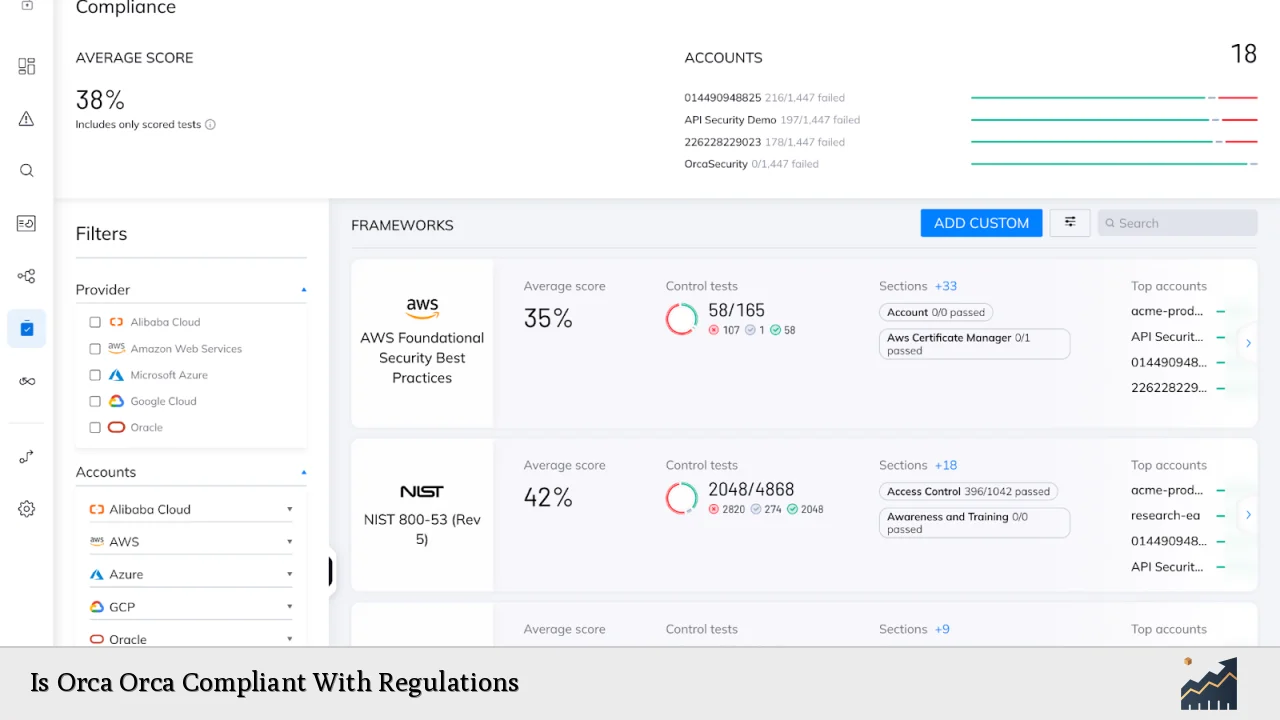Orca Security has emerged as a leading player in the cloud security landscape, offering solutions that help organizations manage compliance across various regulatory frameworks. As businesses increasingly migrate to cloud environments, the need for robust compliance tools becomes paramount. This article explores Orca Security’s capabilities in ensuring regulatory compliance, its market positioning, and the broader implications for organizations relying on cloud services.
| Key Concept | Description/Impact |
|---|---|
| Agentless Deployment | Orca’s platform allows for quick deployment without the need for agents on every cloud workload, facilitating continuous compliance monitoring across multiple cloud providers. |
| Multi-Cloud Compliance | Orca supports compliance checks across various platforms (AWS, Azure, GCP), providing a centralized view of compliance status and risks. |
| Automated Remediation | The platform automates compliance verification and remediation processes, significantly reducing the Mean Time to Remediation (MTTR) for identified issues. |
| Customizable Frameworks | Organizations can tailor compliance frameworks to fit specific needs, enhancing accuracy and reducing false positives in compliance reporting. |
| Comprehensive Reporting | Orca generates detailed reports that facilitate communication with auditors and internal stakeholders regarding compliance status and progress. |
| Regulatory Frameworks Supported | Includes major regulations such as GDPR, HIPAA, PCI-DSS, NIST 800-53, and SOC 2, ensuring broad applicability across industries. |
Market Analysis and Trends
The landscape of cloud security is rapidly evolving as organizations adopt multi-cloud strategies. According to the 2024 State of Cloud Security Report, 81% of organizations have public-facing assets with vulnerabilities, highlighting the urgent need for comprehensive security solutions like those offered by Orca Security. The increasing complexity of cloud environments necessitates tools that not only enhance security but also ensure regulatory compliance across diverse frameworks.
Current Market Statistics
- Growth in Cloud Adoption: The global cloud computing market is expected to grow from $371 billion in 2020 to over $1 trillion by 2028.
- Compliance Challenges: A survey indicated that 60% of organizations struggle with maintaining compliance due to fragmented tools and processes.
- Investment in Security Solutions: Organizations are projected to increase their cybersecurity budgets by 10-15% annually over the next five years.
Implementation Strategies
To effectively utilize Orca Security for regulatory compliance, organizations should consider the following strategies:
- Centralize Compliance Management: Utilize Orca’s dashboard to consolidate compliance checks across all cloud environments. This reduces the complexity of managing multiple tools.
- Automate Compliance Processes: Leverage Orca’s automated remediation capabilities to address vulnerabilities swiftly. This not only enhances security posture but also ensures adherence to compliance requirements.
- Customize Compliance Frameworks: Tailor existing compliance frameworks or create new ones that align with specific organizational needs. This flexibility allows for more accurate assessments and reporting.
- Regular Training and Updates: Ensure that teams are trained on using Orca’s features effectively. Regular updates on regulatory changes should be communicated across departments.
Risk Considerations
While Orca Security provides robust tools for managing compliance, organizations must remain vigilant about potential risks:
- Data Privacy Concerns: With regulations like GDPR imposing strict guidelines on data handling, organizations must ensure that their use of Orca complies with these standards.
- Integration Challenges: Integrating Orca with existing systems may pose challenges. Organizations should plan for potential disruptions during implementation.
- False Sense of Security: Relying solely on automated tools can lead to complacency. Continuous human oversight is essential to complement automated processes.
Regulatory Aspects
Orca Security’s commitment to regulatory compliance is evident through its support for various frameworks:
- GDPR Compliance: Orca has implemented features that help organizations comply with data protection regulations by ensuring proper handling of personal data.
- HIPAA Compliance: For healthcare organizations, Orca provides tools to manage sensitive health information securely while adhering to HIPAA requirements.
- PCI-DSS Compliance: Retailers can utilize Orca’s capabilities to protect customer payment data and maintain PCI-DSS standards effectively.
These features not only simplify compliance management but also provide peace of mind during audits and inspections.
Future Outlook
The future of cloud security and compliance will likely be shaped by several trends:
- Increased Regulatory Scrutiny: As cyber threats evolve, regulators are expected to impose stricter requirements on data protection and privacy.
- AI Integration: The incorporation of artificial intelligence into compliance tools will enhance risk assessment capabilities and automate more complex tasks.
- Focus on Continuous Compliance: Organizations will shift towards continuous monitoring rather than periodic assessments, making tools like Orca indispensable.
By staying ahead of these trends, Orca Security can further solidify its position as a leader in cloud compliance solutions.
Frequently Asked Questions About Is Orca Orca Compliant With Regulations
- What regulatory frameworks does Orca support?
Orca supports a wide range of regulatory frameworks including GDPR, HIPAA, PCI-DSS, NIST 800-53, SOC 2, and more. - How does Orca automate compliance?
The platform automates verification checks and remediation processes, which helps reduce manual effort and improve response times for identified issues. - Can I customize my compliance framework in Orca?
Yes, organizations can tailor existing frameworks or create new ones based on their specific needs. - Is training required to use Orca effectively?
Yes, regular training is recommended to ensure teams are proficient in utilizing all features of the platform. - What are the risks associated with using automated compliance tools?
Potential risks include data privacy concerns, integration challenges with existing systems, and the possibility of a false sense of security if human oversight is lacking. - Does Orca provide reporting features?
Yes, it generates comprehensive reports that help communicate compliance status and progress to stakeholders. - How quickly can I deploy Orca?
The agentless nature of Orca allows for rapid deployment within minutes across multiple cloud environments. - What should I do if my organization faces a compliance breach?
If a breach occurs, it is crucial to follow your incident response plan immediately and leverage Orca’s automated remediation features to address vulnerabilities swiftly.
By understanding these aspects of Orca Security’s capabilities regarding regulatory compliance, organizations can better navigate the complexities of maintaining security in an increasingly digital world.

